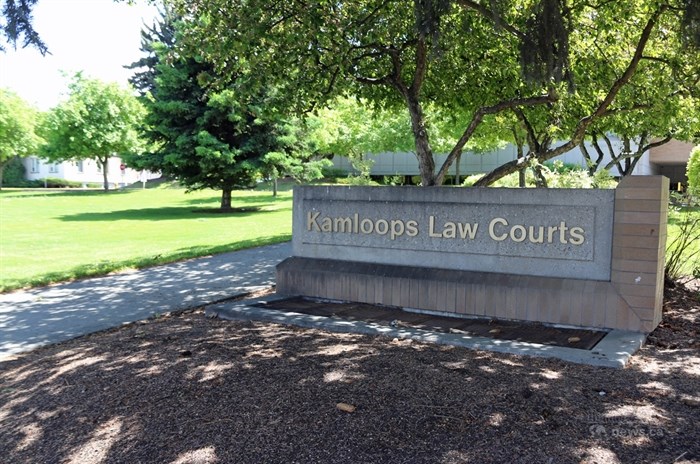
(JENNIFER STAHN / iNFOnews.ca)
May 14, 2015 - 2:14 PM
KAMLOOPS - While a Kamloops Supreme Court Justice acknowledged the testimony of a retired teacher was "carefully woven" in his trial for possession of child pornography, he delivered an acquittal today, May 14.
Jerry Waselenkoff was charged with one count of possessing child porn after a downstairs neighbour, Frans Van Der Woning, located four cases containing child porn disks in the floor joist between condos on McGill Road October 2012.
Justice Ian Meiklem said inconsistent testimony from Van Der Woning along with a lack of direct evidence linking the accused to the disks created a reasonable doubt.
Meiklem said he found Van Der Woning to be a credible witness, but acknowledged some inconsistencies in his evidence from preliminary hearings and at trial. He agreed with Crown prosecutor Frank Caputo who said Waselenkoff added false information to his testimony and took opportunities to mock Van Der Woning.
"I found some portions (of Waselenkoff's testimony) to be absolutely unbelievable," Meiklem said. "I prefer Mr. Van Der Woning's testimony to Mr. Waselenkoff's."
Meiklem said while there were 250 thumbnail images of child porn on Waselenkoff's computer, it was within the hard drive's deleted cache. The justice pointed to evidence from Cpl. Barry Salt who examined the accused's laptop and acknowledged the computer can store artifacts from websites even when the images weren't clicked on or downloaded.
Police seized the computer during an execution of the search warrant which also yielded a vacation photo disk of Waselenkoff's bearing the brand name Smart Buy - the same brand of disk found on some of those contained in the cases. Meiklem said he knew Waselenkoff received the disk in Russia and said the child porn disks could be linked back to members of the junior girl's Russian curling team and coaches who stayed at the accused's apartment for extended period's of time.
In the morning session both lawyers provided closing submissions. Waselenkoff’s lawyer, Glen Orris said there is nothing to prove the accused accessed child pornography on his laptop computer, or if he accessed the same content found on the disks. The disks were produced and hidden by someone else in the floor joist beneath a vent in Waselenkoff’s home, Orris said.
“None of them were matched exactly to the computer (which is) clear evidence Mr. Waselenkoff was not involved in manufacturing those disks or accessing them,” he said. The defence noted the labelling on the disk found in the apartment was not the same as the labelling of those in the cases.
Orris said his client cooperated with every police search and interview, which included agreeing to come to the station and provide fingerprints a second time after police couldn't match the first sample. Even after the second attempt, police never did get a useable print from Waselenkoff.
"Mr. Waselenkoff gave them complete access, but wasn’t concerned about what they would find,” he said.
Crown prosecutor Frank Caputo said his take on the evidence "couldn't really be more different” than Orris’s and pointed to Waselenkoff’s testimony during his day-and-a-half on the stand.
“The evidence of Mr. Waselenkoff is a carefully woven tapestry that accounts for everything that (he) said but puts a spin on it favourable to the accused,” Caputo said.
He said it made no sense why someone would leave their “proverbial stash of Playboy magazines” in someone else’s floor to come back for them later.
"It just doesn’t make sense at the end of the day,” he said.
Caputo said the accused couldn’t explain how police found a disk containing vacation pictures of him on a rare Smart Buy branded disk.
“This rare type of (disk) which has never been seen by a sex crime investigator before has been seen twice,” he said.
Acknowledging Waselenkoff’s cooperation with police, Caputo said the accused deleted child porn images from his computer and cleared his internet cache.
“It’s actually quite reasonable that someone who is not computer literate would simply delete the materials and think they were gone,” he said.
Contrary to Waselenkoff’s theory that someone else put the disks in the space, Caputo said the only access to the area was through the accused’s vent.
Charges were laid in 2013 after the neighbour below Waselenkoff found the disks after cutting a hole in his ceiling during home renovations.
Meiklem is expected to deliver a verdict this afternoon.
For more stories on the trial, click here.
To contact a reporter for this story, email Glynn Brothen at gbrothen@infonews.ca, or call 250-319-7494. To contact the editor, email mjones@infonews.ca or call 250-718-2724.
News from © iNFOnews, 2015